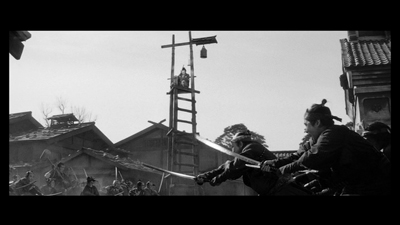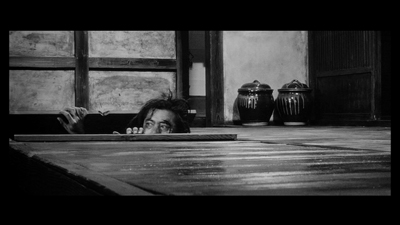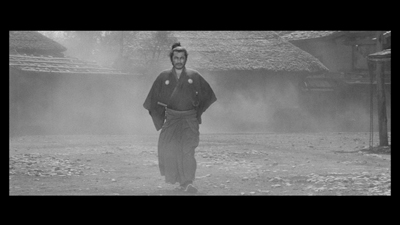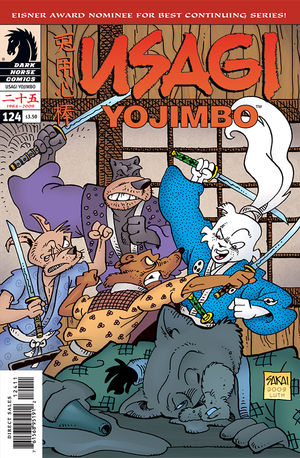
I blame Pedro Costa for my having missed Akira Kurosawa's 100th birthday. I had every intention of reviewing some of the great Japanese director's films for his centennial, especially since Criterion was releasing Yojimbo and its companion Sanjuro on Blu-ray
Still, it's never a bad time to watch an Akira Kurosawa film, especially when it is as much fun as Yojimbo. This 1961 action picture is a marvelous example of genre done right. Kurosawa's main man, the gruff-voiced Toshiro Mifune, stars as a wandering samurai. He is a nameless figure, roving from town to town, who adopts the moniker Kuwabatake Sanjuro. The name is nonsense. When he takes it, he explains that it means "Thirty year-old Mulberry Field," before qualifying it with "Although now I'm almost forty." He's a man without real age, without history, without allegiance.

At the start of Yojimbo, Sanjuro wanders into a town that has been overrun by rival gangs. When Sebei (Seizaburo Kawazu), the mobster in charge of the area, designated his feckless son as the man who would take over his territory, Sebei's top dog, Ushitora (Kyu Sazanka), rebelled and formed his own organization. Now the two square off day after day, effectively shutting down the rest of the village. The constable is in their pocket, and the mayor is ineffective. Only the undertaker (Atsushi Watanabe) is turning a profit.

The local innkeeper, Gonji (Eijiro Tono), urges Sanjuro to move on, but the samurai instead decides to stay. He keeps his plan close to his vest, however, and he seems only interested in profiting on the misery. Instantly sizing up the gangs of outlaws and miscreants as being beneath his skills, he starts pitting the two enemies against one another. If they want his services, they will have to pay. Pretty soon, it's clear that he's messing with both Sebei and Ushitora, stirring up the pot to get them to fight. If they wipe each other out, then the citizens of that forsaken hamlet will be free to go on with their lives.
If the plot of Yojimbo sounds familiar, it's because like all of Akira Kurosawa's samurai films, it's been remade, ripped off, and borrowed from multiple times. The most famous of these remakes was Sergio Leone's A Fistful of Dollars

The funny thing is that even though Kurosawa had an affection for John Ford, he was actually borrowing from another American genre: hardboiled fiction. Kurosawa was really just lifting the plot from one of Dashiell Hammett's pulpier books, Red Harvest

The dusty streets of Old Japan sure do look like Old West America, though, and Kurosawa uses them to his best advantage. There is a real sense of movement throughout Yojimbo. Long tracking shots cover the full length of the empty streets, and as Sanjuro wanders between the two factions, Kazuo Miyagawa's camera follows him. It's the same when he's indoors. The hallways of Sebei's brothel work like a maze, and Sanjuro navigates them to stay up on what is happening. Perhaps more memorable, though, is his escape later in the picture after having been beaten to a pulp. Unable to move fast enough to run once he busts loose, Sanjuro crawls under the town. The houses and shops are all lifted out of the dirt, leaving him with a crawlspace. He is down below as Ushitora's men hunt for him up above. The sound effects of all the slippered feet running across the wooden walkways creates a nail-biting tension. When will the posse change direction and pass overhead?


Sanjuro's eventual capture and his getting beaten is another tradition started by Kurosawa. In every one of Eastwood's Man With No Name pictures, he has the tar knocked out of him just before the third act. He then disappears into a hiding space where he rests and recharges, ready to come back and kick some butt. By this time, our hero has proven what a good guy he really is, and it's usually a good deed that gets him caught. What I like about Sanjuro and what makes him a more likable character than Eastwood's is that rather than keeping mum most of the time, he has a sense of humor. He is generally bemused by the goings on, as well as frustrated by the townspeople's inability to accept his aid without getting on his nerves. In Yojimbo, when he helps out a local family, they hang around to thank him while the bad guys are coming their way.
Kurosawa also generously seasons his hoodlums with comedy. There are many funny scenes where the lowlife brigands brag to Sanjuro about their skills or tell tales out of school while drunk. The two assassins that Sanjuro captures, in particular, remind me of Shakespearian clowns, and given Kurosawa's appreciation of the Bard, it's not much of a stretch to assume that's why he injected comic relief into the proceedings. His villains can also pretty goofy looking, like Ushitora's brother, the pig-faced Inokichi (Daisuke Kato). Kurosawa gives him a personality to match his dumb face. He's a crass braggart who usually bumbles his way into his brother's wrath.


The exception amongst the outlaws is the character Unosuke (Tatsuya Nakadai). Unosuke is the top fighter in Ushitora's gang, and when he returns to town midway through the movie, the difference between him and the other misfits is instantly obvious. Unosuke is a suave pretty boy who is as sharp as he is skilled. He also ends up being a symbol of the changing code of honor and encroaching modernity. This killer arrives with a pistol. He is trading in his sword and signing on to be a gunslinger. The perceived advantage in power makes him mean and especially callous to human life. He doesn't pull his blade or engage in a one-on-one duel, he fires from a distance. He ends up being the main foe for Sanjuro, and how their showdown plays out is an important component to the ronin's victory. Not surprisingly, Unosuke is dishonorable right up to the end.

When Unosuke arrives, Gonji compares his agile appearance to that of a rabbit, and notes that his name is a pun on the rabbit in the Japanese zodiac. Though this character was not an influence on another rabbit ronin, I'd be remiss if I didn't mention that Yojimbo, and really all of Kurosawa's samurai films, has given direct inspiration to Stan Sakai's marvelous comic book series Usagi Yojimbo. The character of Usagi is a wandering samurai just like Sanjuro, though he is directly based on the historical swordsman Miyamoto Musashi, whom Toshiro Mifune also portrayed in the three-part Samurai series. Sakai has used elements of the Yojimbo movie plot in his long-running series more than once, most recently in the two part "A Town Called Hell" story from issues #124 and #125, published by Dark Horse Comics at the end of last year.
Despite all the imitators, there is still no beating the original, and no replicating that incredible Toshiro Mifune screen presence. It's a shame that he isn't considered a bigger star around the world, he was easily as impressive as any of the greats of old Hollywood. Just watch the scenes where he tries to maintain his gruffness when the innkeeper has found him out, or when he joyfully watches the bad guys killing each other while hiding in a casket. He's a big teddy bear! Don't you kind of want to give him a huge hug? Or at least get a sake togther.

See Yojimbo's trailer.

1 comment:
The Green Planet Movie Awards held a special tribute to Akira Kurosawa on his 100th birthday at the Westin Bonaventure Hotel on March 23, 2010. Check out http://www.movie-voters.com/9301.html
Post a Comment